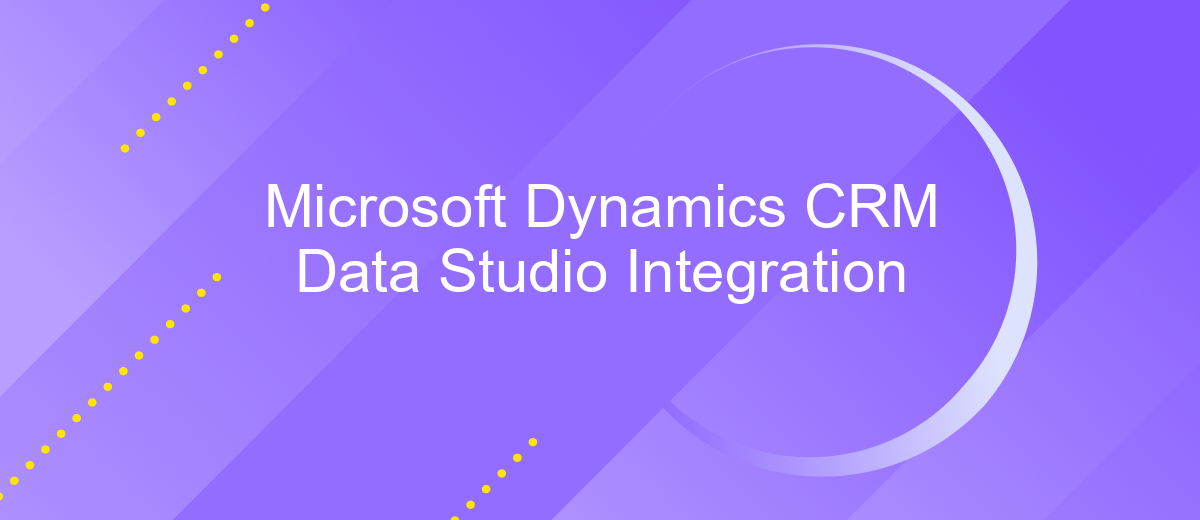Microsoft Dynamics CRM Data Studio Integration
Microsoft Dynamics CRM Data Studio Integration revolutionizes how businesses manage and analyze customer data. By seamlessly connecting Microsoft Dynamics CRM with Power BI's Data Studio, organizations can unlock powerful insights, streamline workflows, and enhance decision-making processes. This integration empowers users to visualize complex data sets, generate real-time reports, and drive strategic initiatives with greater efficiency and accuracy.
Overview
Microsoft Dynamics CRM Data Studio Integration is a powerful solution for businesses looking to enhance their customer relationship management capabilities. This integration allows users to leverage the robust data analytics and visualization tools of Data Studio within the Microsoft Dynamics CRM environment. By combining these two platforms, organizations can gain deeper insights into their customer data, streamline workflows, and make more informed decisions.
- Seamless data synchronization between Microsoft Dynamics CRM and Data Studio
- Advanced data visualization and reporting capabilities
- Enhanced data analysis with real-time insights
- Customizable dashboards and reports tailored to business needs
- Improved decision-making through comprehensive data analytics
With the integration of Microsoft Dynamics CRM and Data Studio, businesses can unlock the full potential of their customer data. This integration not only improves the efficiency of data management processes but also provides a more comprehensive view of customer interactions and behaviors. As a result, companies can develop more targeted marketing strategies, improve customer service, and ultimately drive business growth.
Benefits

Integrating Microsoft Dynamics CRM with Data Studio offers a multitude of benefits that streamline business operations. This powerful combination enables seamless data synchronization, ensuring that your CRM data is always up-to-date and readily available for in-depth analysis. By leveraging Data Studio's advanced visualization tools, businesses can gain actionable insights from their CRM data, driving more informed decision-making processes. Enhanced reporting capabilities mean that teams can easily track performance metrics, identify trends, and make data-driven adjustments to their strategies.
Moreover, the integration process can be simplified with services like ApiX-Drive, which provide user-friendly solutions for connecting Microsoft Dynamics CRM with Data Studio. ApiX-Drive automates data transfer, reducing the need for manual data entry and minimizing the risk of errors. This not only saves time but also ensures data accuracy and consistency. As a result, businesses can focus more on strategic initiatives rather than getting bogged down by technical complexities. Overall, integrating Microsoft Dynamics CRM with Data Studio, especially with the help of tools like ApiX-Drive, enhances operational efficiency and empowers businesses to harness the full potential of their data.
Technical Requirements

To successfully integrate Microsoft Dynamics CRM with Data Studio, certain technical requirements must be met to ensure seamless functionality and performance. These prerequisites involve both software and hardware specifications, as well as network configurations.
- Operating System: Windows Server 2016 or later, or a compatible version of Linux.
- Database: SQL Server 2016 or later for storing CRM data.
- RAM: Minimum of 8GB, recommended 16GB or higher for optimal performance.
- CPU: Quad-core processor or higher.
- Network: Stable internet connection with a minimum bandwidth of 10 Mbps.
- Microsoft Dynamics CRM: Version 9.0 or later.
- Data Studio: Latest version with all necessary plugins and extensions.
- APIs: Enabled and configured for data exchange between CRM and Data Studio.
Meeting these technical requirements is crucial for ensuring that the integration process is smooth and efficient. Proper configuration and adherence to these specifications will help in achieving optimal performance and reliability in data synchronization between Microsoft Dynamics CRM and Data Studio.
Installation and Configuration

To integrate Microsoft Dynamics CRM with Data Studio, first ensure that you have the necessary permissions and access rights in both platforms. Begin by downloading the appropriate connector from the Microsoft AppSource or the Data Studio connector library. This connector will facilitate the data flow between the CRM and Data Studio.
Once the connector is downloaded, install it by following the on-screen instructions. During the installation, you will need to provide your Microsoft Dynamics CRM credentials to authenticate the connection. Make sure to use a secure and reliable network to avoid any interruptions during the setup process.
- Download the connector from Microsoft AppSource or Data Studio library.
- Install the connector and follow the on-screen instructions.
- Authenticate using your Microsoft Dynamics CRM credentials.
- Configure the data sync settings according to your requirements.
After the installation is complete, navigate to the configuration settings within Data Studio. Here, you can customize the data sync preferences, such as selecting specific data fields and setting up automated sync schedules. Ensure that all settings align with your business needs to maximize the integration's efficiency.
- Automate the work of an online store or landing
- Empower through integration
- Don't spend money on programmers and integrators
- Save time by automating routine tasks
Troubleshooting
If you encounter issues while integrating Microsoft Dynamics CRM with Data Studio, first ensure that all API permissions are correctly configured. Double-check the credentials and tokens used for the integration to verify they have not expired or been revoked. Sometimes, minor configuration errors can cause major disruptions, so it's crucial to scrutinize every detail.
Another common problem is data syncing. If data is not syncing as expected, review the data mapping settings. Tools like ApiX-Drive can simplify this process by providing a user-friendly interface for mapping data fields between Microsoft Dynamics CRM and Data Studio. Additionally, make sure that both systems are updated to their latest versions, as bugs in outdated software can often lead to integration issues. If problems persist, consult the official documentation or reach out to customer support for both platforms.
FAQ
What is Microsoft Dynamics CRM Data Studio Integration?
How can I integrate Microsoft Dynamics CRM with Data Studio?
What are the benefits of integrating Microsoft Dynamics CRM with Data Studio?
Is coding knowledge required for integrating Microsoft Dynamics CRM with Data Studio?
Can I automate the data transfer between Microsoft Dynamics CRM and Data Studio?
Strive to take your business to the next level, achieve your goals faster and more efficiently? Apix-Drive is your reliable assistant for these tasks. An online service and application connector will help you automate key business processes and get rid of the routine. You and your employees will free up time for important core tasks. Try Apix-Drive features for free to see the effectiveness of the online connector for yourself.


